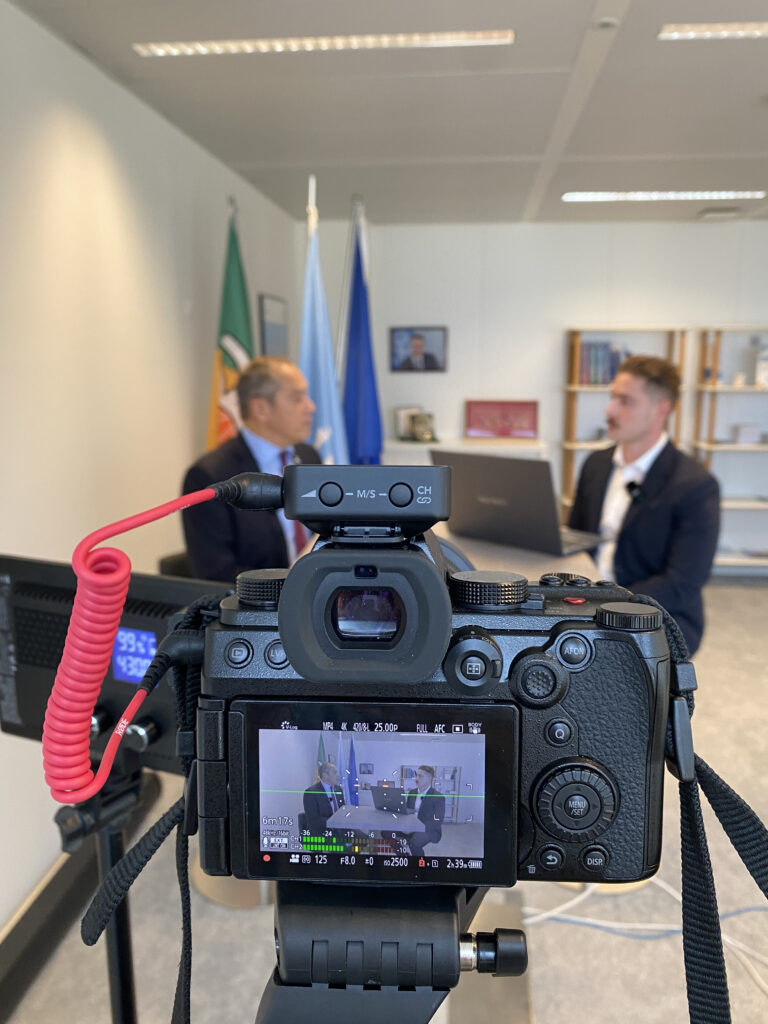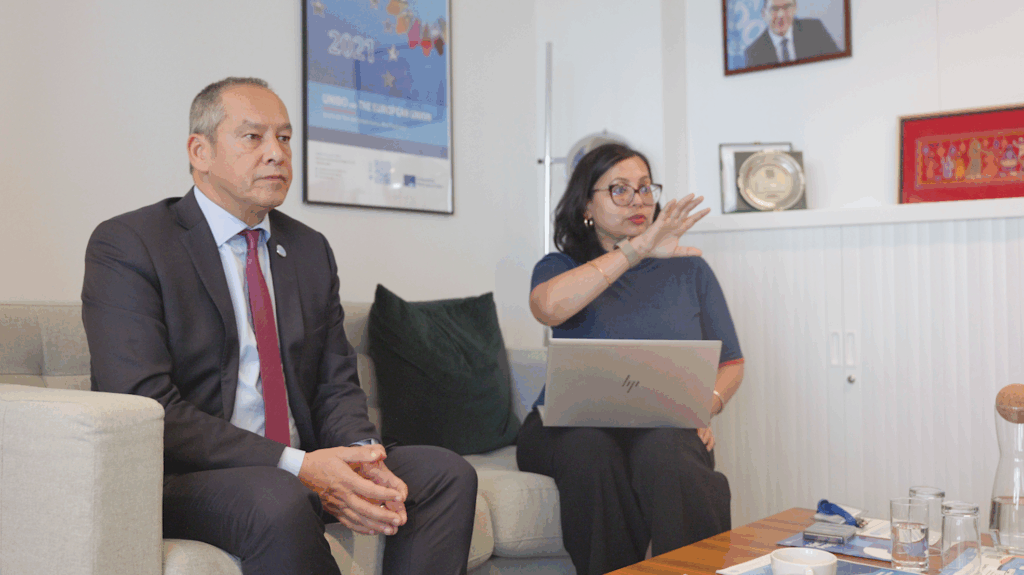Why Industrial Diplomacy Matters in the Global Polycrisis

A global polycrisis is reshaping geopolitics, supply chains and climate action. At the UN House in Brussels, Journalist Ahmetcan Uzlaşık speaks with Christophe Yvetot, UNIDO (UN Industrial Development Organization) Representative to the European Union, about the future of industrial diplomacy in a rapidly changing world.
With nearly three decades of experience supporting governments on industrial development, Yvetot argues that industry, often seen as the source of environmental and climate pressures, is also a powerful engine of solutions. In this conversation he explains why clean technologies, circular value chains and new models of cooperation are essential to navigate today’s overlapping crises.
What opportunities do you see emerging from today’s global polycrisis?
the first big shock. Suddenly global supply chains broke down and we realised how vulnerable we were. Items we took for granted disappeared from shelves. Masks, paracetamol, basic medical supplies were suddenly not available. It was a profound wake up call.
Today we also face trade tensions that reveal the fragility of global supply chains, while climate related disasters intensify. At UNIDO we have the advantage of working with industrial statistics, and this allows us to look beyond the daily headlines. When you consider the megatrends shaping our future, demographic transition, climate and energy transition, global trade rebalancing and the fourth industrial revolution, it becomes clear that industry is at the center.
Industry is responsible for part of the problem, but it is also indispensable to any solution. Everything we use, from transport to buildings to digital technologies, relies on industrial transformation. As countries rethink their manufacturing strategies, we see again how crucial industry is for innovation, jobs and prosperity. Industry can help resolve environmental crises while restoring economic stability.

What would a truly sustainable industrial revolution look like in practice?
There are two major reports that many people working in policy recently refer to, the Draghi report and the Letta report. Both emphasise competitiveness and the single market and innovation is at the heart of their recommendations. UNIDO is headquartered in Austria, the home of economist Schumpeter, who described innovation as the force behind creative destruction. New technologies disrupt old markets, but they also create new opportunities and new companies.
To make this innovation work for society, we need competition policies that prevent dominant players from becoming monopolies. Europe’s internal market helps support this balance. At the same time, Europe needs to remain connected to the world. Fragmentation will undermine prosperity for everyone. This is why the Global Gateway seeks to build strong partnerships rather than isolation.
This is also where UNIDO plays a role. Developing countries need to move beyond exporting raw materials. They need to add value locally by creating jobs and manufacturing capacity. Europe needs resources for its clean tech transformation. With fair industrial partnerships both sides can progress together. A truly sustainable industrial revolution means innovation, clean technologies and fair value creation.
Can you share an example where cooperation between the EU and UNIDO has delivered real impact?
A strong example is the Switch to Circular Value Chains program. It brings innovation to manufacturing sectors in order to build a circular economy based on avoiding pollution and eliminating waste. Waste is not really waste. It is only raw material we have not yet learned how to reuse.
Industrial symbiosis is part of the solution. The waste of one company becomes the input of another. Recently we met diplomats from Pakistan and Bangladesh who described how the program helped textile industries transform waste into profitable side products. They created new jobs while reducing environmental impact. These benefits are not limited to wealthy countries. Even economies with limited resources can use circular models to improve competitiveness.
EU funded programs allow small and medium enterprises (SMEs) to access skills, technology and finance they would otherwise lack. The impact is clear. In programs like SwitchMed, for every €100 invested in public funds, companies generated €400 to €500 in private investment. It is one of the most efficient uses of development funding.

What are the biggest challenges for industries transitioning to circular models?
The biggest challenge is information. Many SMEs do not know that these solutions exist or that they are already used successfully in other countries. Without targeted support, innovation remains invisible.
EU funded programs help fill this gap by providing SMEs with skills, technology and initial funding. Once they have this support, the potential is enormous. Our experience in the Mediterranean region has shown that small companies can unlock several times more private investment once they understand circular practices. Public funding acts as a catalyst.
If you could choose one action to accelerate SDG, Sustainable Industry, Innovation and Infrastructure, globally, what would it be?
Clean technologies. Clean tech produces high quality jobs, stimulates innovation and supports modern competitive industries. Everywhere we look, clean tech sectors grow steadily. They create economic progress and reduce environmental pressure. Moving decisively toward clean tech is the clearest path for aligning prosperity with sustainability.
How can we ensure developing countries are not left behind in the fourth industrial revolution?
Global rebalancing has had mixed effects. Many Asian countries benefited from industrial relocation. China, South Korea and others lifted more than a billion people out of poverty. But this shift also caused social pain in Europe and the United States, contributing to political backlash.
At the same time, regions like Africa did not benefit enough from industrialisation, despite having the world’s largest future workforce and abundant natural resources. This is why partnerships between Africa and Europe are central to UNIDO’s work in Brussels.
The Global Gateway and the EU’s Critical Raw Materials Act both emphasise that local industrialization must be part of future agreements. Developing countries should not only provide resources. They should also create jobs, skills and value locally. Shared prosperity is the only sustainable path forward.
How can industrial diplomacy maintain momentum on decarbonisation despite political resistance?
We must show that decarbonisation is good business. UNIDO’s latest industrial statistics show a global decoupling between industrial production and CO₂ emissions for the first time in history. Industry is becoming more energy efficient, and efficiency reduces costs while increasing profitability.
Some governments may hesitate, but consumers do not want to return to fossil pollution. Market rules will also continue pushing decarbonisation. Europe will require low carbon standards for imports. Companies that refuse to decarbonise will not have access to the world’s largest single market.
Economic logic and public expectations will keep the transition moving.
Is multilateralism still possible in a world shaped by transactional diplomacy?
During the negotiations of the Sustainable Development Goals (SDGs), there were proposals to set minimum industry levels globally. While these did not become official targets, the idea remains relevant, especially for the poorest countries.
Climate risk is also forcing cooperation. There are already regions where insurance companies refuse to operate due to environmental disasters. Industrial transformation is not ideological. It is a necessity.
Global public goods, shared trade standards and international norms make global trade possible. Without them, purely national approaches will fail. Multilateral action is still the most effective tool we have.